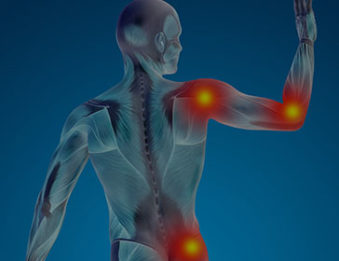


If you or a loved one has recently been diagnosed with sarcoma, it’s likely that you have a lot of questions. That’s why Mat-Su Valley Cancer Center has put together this information portal. In it, you will find answers to a number of common questions about soft tissue tumors and their treatments.
The most basic way to think of sarcoma is as a tumor of the body’s soft and connective tissues. Surprisingly, this includes bone, as well as the following tissue types:
Since these tumors can affect such a broad range of tissues over a large area of the body, radiation oncologists have classified over 50 subtypes of sarcoma. Each subtype is unique for its speed of spread, growth pattern, and/or the tissue it originates in.
Regardless of diagnosis type, our sarcoma treatment plans are based on the stage of cancer. This means that there will be different approaches for a tumor that has not moved into any other tissue than for one that has. It’s important that your treatment plan reflects both the stage and the subtype of the sarcoma you were diagnosed with.
Currently, all treatments for sarcoma are surgically based. There may be some use of radiation or chemotherapy to help mitigate the effects but by and large, the solution will be surgical.
Sarcoma is a broad term for soft tissue cancers that can be applied to a number of conditions that have more differences than they do common aspects sometimes. One can always count on the sarcoma to be a tumor, but whether it is malignant or benign, its growth trajectory and even its structure can vary from subtype to subtype. That’s why it is important to understand as much as possible about your specific diagnosis.
There are over 50 subtypes of sarcoma that are classified by factors that include their growth pattern, structure, and the tissue they primarily affect. It would be cumbersome to list them all here because many are quite rare, but some of the more common subtypes include:
These sarcoma subtypes are paired with an assessment of the tumor’s size and other factors to help determine what stage the cancer is in when it is diagnosed.
In addition to whether or not the lymph nodes are affected and whether or not metastasis has occurred, radiation oncologists working on sarcoma also grade the tumor’s size when assigning a stage to the cancer. Those sizes are:
Tumors that do not have lymph node involvement and have not metastasized are typically assigned stage 1 or 2. Tumors that have metastasized might be assigned stage 3, but are more likely stage 4. Call us today to schedule a sarcoma screening or inquire about our many cancer treatment services. Our team of oncologists specializes in the following:
 Unfortunately, there is no easy way to detect sarcomas. At least, not for the majority of the population. There is a genetic test that can determine whether or not you have a predisposition to developing these tumors but only for people who have a specific family history of cancers and other related tumors. For everyone else, the recommendation is that you consult with your doctor immediately if you find any growth or a new lump that you can’t readily explain as being related to a pre-existing condition.
Unfortunately, there is no easy way to detect sarcomas. At least, not for the majority of the population. There is a genetic test that can determine whether or not you have a predisposition to developing these tumors but only for people who have a specific family history of cancers and other related tumors. For everyone else, the recommendation is that you consult with your doctor immediately if you find any growth or a new lump that you can’t readily explain as being related to a pre-existing condition.
Regardless of the type of sarcoma, the main treatment remains the same, and that is a surgical solution. This is because the only way to cure sarcoma is to remove it completely from the body. Other therapies may be used to support the surgical solution, but every Anchorage sarcoma treatment involves surgical intervention heavily.
A sarcoma is a tumor of your connective tissue including muscle, fat, bone, blood vessels, cartilage and other connective tissues.
The most common cancers are carcinomas and include breast, prostate, lung, and colon cancer. Cancers of the blood and immune system are are leukemias and lymphomas. These are different cancers from sarcomas.
It is unclear how most sarcomas arise. Some patients can have a familial syndrome that can lead to a sarcoma, but these are rare cases.
Sarcomas are cared for by teams of radiation oncologists. At Mat-Su Valley Cancer Center, we have a group of surgeons, pathologists, medical oncologists, radiation oncologists and radiologists who take care of sarcoma patients.
Contact us at Mat-Su Valley Cancer Center at 907-707-1333. We are here to explain the variety of treatment options available to you and make sure all of your questions are answered. For your convenience, we also have an online contact form that you may use to ask your questions or make your first appointment. Your first phone consultation is free, so don’t hesitate to give us a call today. You owe it to yourself to explore all treatment options available to you.